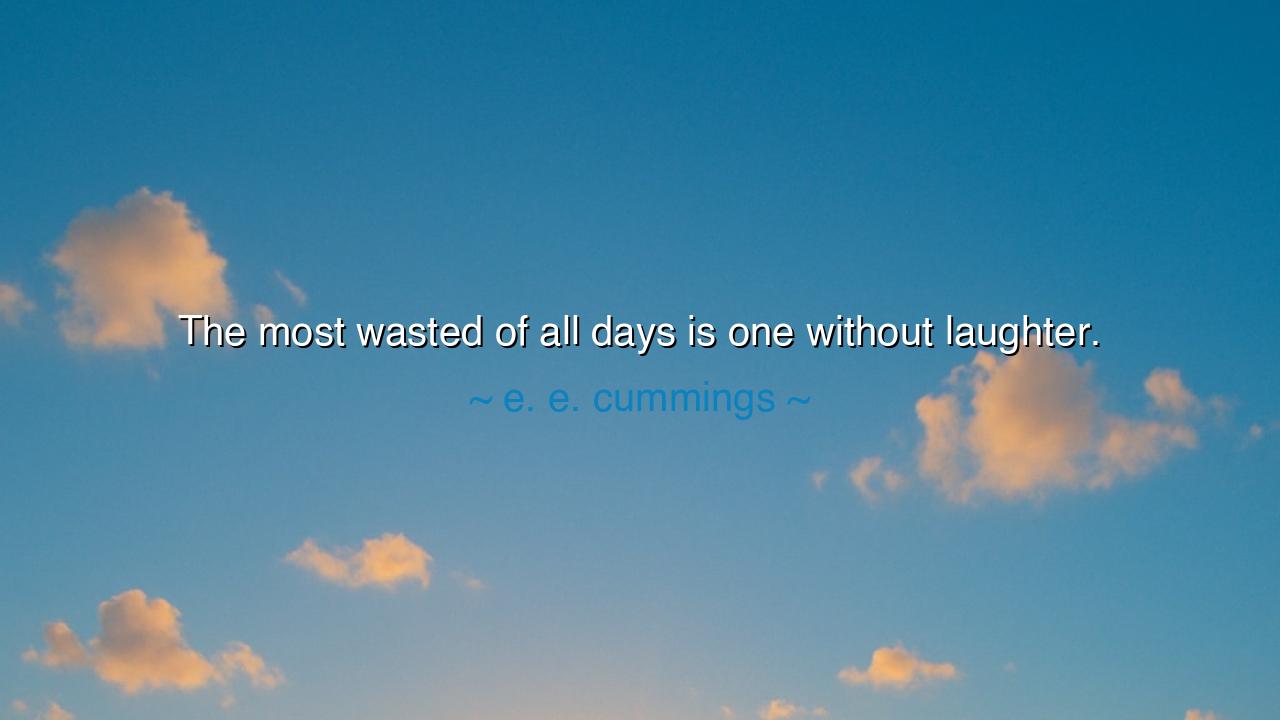
The most wasted of all days is one without laughter.






The poet of gentle rebellion, e. e. cummings, once wrote: “The most wasted of all days is one without laughter.” These words, like much of his work, are simple in form but profound in spirit. Beneath their soft rhythm lies a philosophy of living — that joy, humor, and laughter are not indulgences, but necessities. For cummings, whose poetry often defied convention and celebrated the fullness of the human soul, laughter was not a fleeting pleasure; it was a declaration of freedom. To laugh is to affirm life — to stand in the sunlight even when the sky is gray.
e. e. cummings lived through times of great turmoil — the First World War, the Great Depression, and the shifting values of the modern world. Yet, through it all, his poetry sang with wonder, playfulness, and the fierce defense of individuality. He rejected the mechanical seriousness of his age, believing that people too often forgot to live while trying to survive. When he spoke of “wasted days,” he was not referring to days without achievement or labor, but to those devoid of spirit — days when the heart forgot to feel delight, when the lips forgot to smile. For cummings, a day without laughter is a day in which the soul sleeps.
The ancients understood this truth long before him. The Stoic philosopher Epictetus wrote that the greatest sign of wisdom is serenity, and serenity cannot exist without a lightness of heart. Laughter, therefore, becomes a form of wisdom — a refusal to let life’s heaviness extinguish our inner flame. Even Aristotle, the father of logic, believed that laughter was what separated man from beast; it was a mark of consciousness, the ability to see both tragedy and beauty in the same moment. Cummings’ words, though modern in tone, echo these timeless teachings — that laughter is not mere amusement, but the very expression of life’s endurance and grace.
Consider the example of Helen Keller, who, though blind and deaf, lived a life radiant with joy. She once said, “A day without laughter is a day wasted.” Her laughter, unbound by sight or sound, was an act of courage — a rebellion against despair. Like cummings, she knew that laughter is a kind of light, one that can pierce even the deepest darkness. Such laughter does not come from comfort, but from strength; it is the song of those who refuse to let circumstance define the spirit.
When cummings spoke of laughter as the measure of a day’s worth, he was offering not a command, but an invitation — to find beauty in imperfection, to rediscover play in a world grown too solemn. He was, at heart, a poet of awakening. He believed that to laugh is to return to innocence, to the state of the child who sees wonder in the ordinary. For him, laughter was not an escape from seriousness, but a sacred balance to it. It kept the human spirit supple, curious, and alive.
And yet, there is a quiet defiance in his words as well. To laugh, especially in a world burdened by suffering, is a radical act. It says to pain, “You will not have the last word.” It is a way of reclaiming power — of choosing joy not because life is easy, but because the heart refuses to grow numb. Cummings, who valued individuality above conformity, saw laughter as one of the purest expressions of freedom. A person who can laugh, even amid struggle, has not been conquered.
So, my listener, take this teaching to heart: guard your laughter, for it is your life’s fire. Do not let the grind of days steal your joy. Find something — a sunrise, a story, a friend’s voice — that makes your heart lift, and honor it. For every laugh is a renewal of being, a reminder that you are still alive, still feeling, still human. As e. e. cummings reminds us, it is not success, wealth, or even wisdom that defines a day well-lived — it is the presence of laughter, that golden sound of the soul remembering that, despite everything, life is beautiful.






AAdministratorAdministrator
Welcome, honored guests. Please leave a comment, we will respond soon